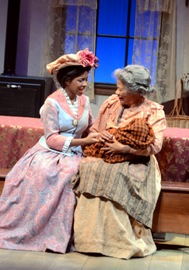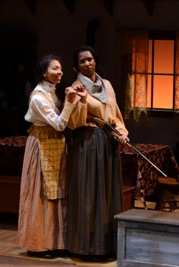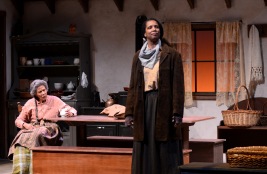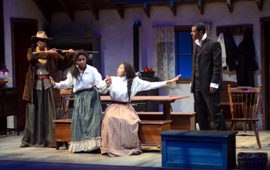
12 Years A Slave’s recent Oscar wins make Flyin’ West, Pearl Cleage’s post-Civil-War slice-of-African-American-life-on-the-Kansas-plains, a particularly serendipitous choice as International City Theatre’s latest crowd-pleaser. That director Saundra McClain and her cast of six have come up with a particularly fine production of Cleage’s 1992 hit is icing on the cake, or in the case of Flyin’ West, ice cream on the apple pie.
The apple pie in question is one of the secret recipes of 73-year-old freed slave Miss Leah (Robin Braxton), who along with 30somethings Sophie (Cheri Lynne VandenHeuvel), Fannie (Leilani Smith), and Wil (Boise Holmes), has put down roots in the all-black Kansas town of Nicodemus, just four of the as many as forty-thousand African-Americans who followed Benjamin “Pap” Singleton out west in the “Exodus of 1879” on a quest for land and liberty.
 Serving as the catalyst for Flyin’ West’s two acts is the return from England of Fannie’s younger sister Minnie (Aisha D. Benton) and her poet husband Frank (Dylan Mooney), a visit prompted by the death of “mulatto” Frank’s onetime slave owner father, on whose monthly checks the expatriate couple have been financing their London sojourn, an overseas life now in jeopardy should Frank’s claim to one-third of his father’s inheritance be denied.
Serving as the catalyst for Flyin’ West’s two acts is the return from England of Fannie’s younger sister Minnie (Aisha D. Benton) and her poet husband Frank (Dylan Mooney), a visit prompted by the death of “mulatto” Frank’s onetime slave owner father, on whose monthly checks the expatriate couple have been financing their London sojourn, an overseas life now in jeopardy should Frank’s claim to one-third of his father’s inheritance be denied.
Though Sophie too is of mixed-race parentage, there’s little else she and Frank have in common, the former’s pride in her status as a “free Negro woman” in marked contrast to Frank’s pride in being taken for white, and in an expatriate life that has him surrounded by those of his father’s race.
That bruises on Minnie’s face seem more likely the result of spousal abuse than the accident she claims to be their cause is but one more reason for Miss Leah, Sophie, Fannie, and Win to mistrust her wannabe-Londoner husband, whose eyes light up when he learns that white speculators would be more than willing to pay a whopping $50,000 (well over a million dollars in today’s currency) for Minnie’s share of the three women’s land.
Could it be that Minnie and Frank’s visit will drive a stake into Sophie’s dreams of “colored folks farms and colored folks wheat fields and colored folks cattle everywhere you look’’?
 Like August Wilson’s Pittsburgh Cycle plays (Jitney, Two Trains Running, Gem Of The Ocean, Joe Turner’s Come And Gone, etc.), Cleage’s Flyin’ West brings to vivid life a largely unknown chapter in African-American history, and is well worth seeing simply for the light it sheds on a time and place not all that far removed from the then recently fought Civil War, a time and place in which black women and men found themselves at last able to forge free and independent lives, achieving hopes and dreams that would have seemed impossible only decades before.
Like August Wilson’s Pittsburgh Cycle plays (Jitney, Two Trains Running, Gem Of The Ocean, Joe Turner’s Come And Gone, etc.), Cleage’s Flyin’ West brings to vivid life a largely unknown chapter in African-American history, and is well worth seeing simply for the light it sheds on a time and place not all that far removed from the then recently fought Civil War, a time and place in which black women and men found themselves at last able to forge free and independent lives, achieving hopes and dreams that would have seemed impossible only decades before.
In fact, in Sophie’s wish for “a place where a colored woman can be free to live her life like a human being,” “a place where a colored man can work as hard for himself as we used to work for white folks,” and “a town where a colored child can go to anybody’s door and be treated like they belong there,” playwright Cleage reveals the same hopes and dreams as those expressed by American Civil Rights leaders a half-century later.
At the same time, by featuring the very elements (greed, revenge, rape, murder, and yes, even romantic love) that have turned novels into bestsellers and movies into box-office smashes, Flyin’ West succeeds not just as historical documentation but as family saga and personal drama as well.
Director McClain understands Fyin’ West’s value as historical artifact, as political statement, and as family drama, and her cast rewards her vision with some terrific performances.
 VandenHeuvel’s Amazonian proportions command attention from Sophie’s first entrance, but it is the strength and guts the Shakespeare vet displays as Flyin’ West’s roughly-hewn heroine that elevate her performance from powerful to veritable force of nature.
VandenHeuvel’s Amazonian proportions command attention from Sophie’s first entrance, but it is the strength and guts the Shakespeare vet displays as Flyin’ West’s roughly-hewn heroine that elevate her performance from powerful to veritable force of nature.
Equally memorable is Braxton’s warm and winning turn as Miss Leah, the veteran actress vanishing inside the former slave’s weakened body and weathered skin, and never more so than when recalling Miss Leah’s horrific past, recollections of being bred like a farm animal, of giving birth to baby after baby without ever being able to hold one of them in her arms, of freedom and love denied.
 Smith is wonderful as Flyin’ West’s peacemaking Fannie, whose blossoming love story with a splendid Holmes’ Wil, a gentleman and a gentle man, is played with simple, touching honesty. Benton is excellent too as the victimized Minnie, a woman whose loving upbringing did not prepare her for a marriage in which love could so quickly turn to violence.
Smith is wonderful as Flyin’ West’s peacemaking Fannie, whose blossoming love story with a splendid Holmes’ Wil, a gentleman and a gentle man, is played with simple, touching honesty. Benton is excellent too as the victimized Minnie, a woman whose loving upbringing did not prepare her for a marriage in which love could so quickly turn to violence.
And then there’s Frank, a tough role both to cast and to nail, since as the character himself reminds us again and again, this is a man who passes both willingly and effortlessly for white, not merely because of his physical appearance but, we presume, because of carefully cultivated manners and mannerisms. Mooney is a fine actor with leading man looks and physique, but I found it hard to believe that his Frank could “pass,” and not simply for reasons over which Mooney has no control. In order to believe in Frank as Cleage writes him, we need to hear the voice of a man who had spent years cultivating the speech patterns of his father and half-brothers, a self-styled Ashley Wilkes if you will, and in this Mooney could do more to convince.
 There is nothing at all unconvincing about the work being done by ICT’s crackerjack design team. Resident scenic designer JR Bruce once again works his magic on the ICT stage, giving us a little house on the Kansas prairie built with a combination of sweat and love, his set meticulously dressed by resident properties designers Patty, Gordon and Christopher Briles. Donna Ruzika’s exquisite lighting design is complemented by resident sound designer Dave Mickey’s as always standout work, while resident costume designer Kim DeShazo has again come up with a bevy of spot-on period wear and resident designer Anthony Gagliardi with first-rate hair and wig design.
There is nothing at all unconvincing about the work being done by ICT’s crackerjack design team. Resident scenic designer JR Bruce once again works his magic on the ICT stage, giving us a little house on the Kansas prairie built with a combination of sweat and love, his set meticulously dressed by resident properties designers Patty, Gordon and Christopher Briles. Donna Ruzika’s exquisite lighting design is complemented by resident sound designer Dave Mickey’s as always standout work, while resident costume designer Kim DeShazo has again come up with a bevy of spot-on period wear and resident designer Anthony Gagliardi with first-rate hair and wig design.
Flyin’ West is produced by caryn desai. Pat Loeb is production stage manager and Tim S. Wright assistant stage manager. Michael Donovan, CSA, is resident casting director, assisted by Richie Ferris.
In her Opening Night remarks, International City Theatre artistic director desai referred to ICT’s ongoing efforts to reach out to a more ethnically diverse audience. Flyin’ West succeeds in doing just that, and wonderfully so, while at the same time being far more than a mere “niche-audience” production. Well worth being seen by playgoers of any race or ethnicity, Flyin’ West is marvelous theater pure and simple.
International City Theatre, Long Beach Performing Arts Center, 300 E. Ocean Blvd., Long Beach.
www.InternationalCityTheatre.org
–Steven Stanley
March 12, 2014
Photos: Suzanne Mapes
Tags: Flyin' West, International City Theatre, Los Angeles Theater Review, Pearl Cleage


 Since 2007, Steven Stanley's StageSceneLA.com has spotlighted the best in Southern California theater via reviews, interviews, and its annual StageSceneLA Scenies.
Since 2007, Steven Stanley's StageSceneLA.com has spotlighted the best in Southern California theater via reviews, interviews, and its annual StageSceneLA Scenies.







 COPYRIGHT 2025 STEVEN STANLEY :: DESIGN BY
COPYRIGHT 2025 STEVEN STANLEY :: DESIGN BY